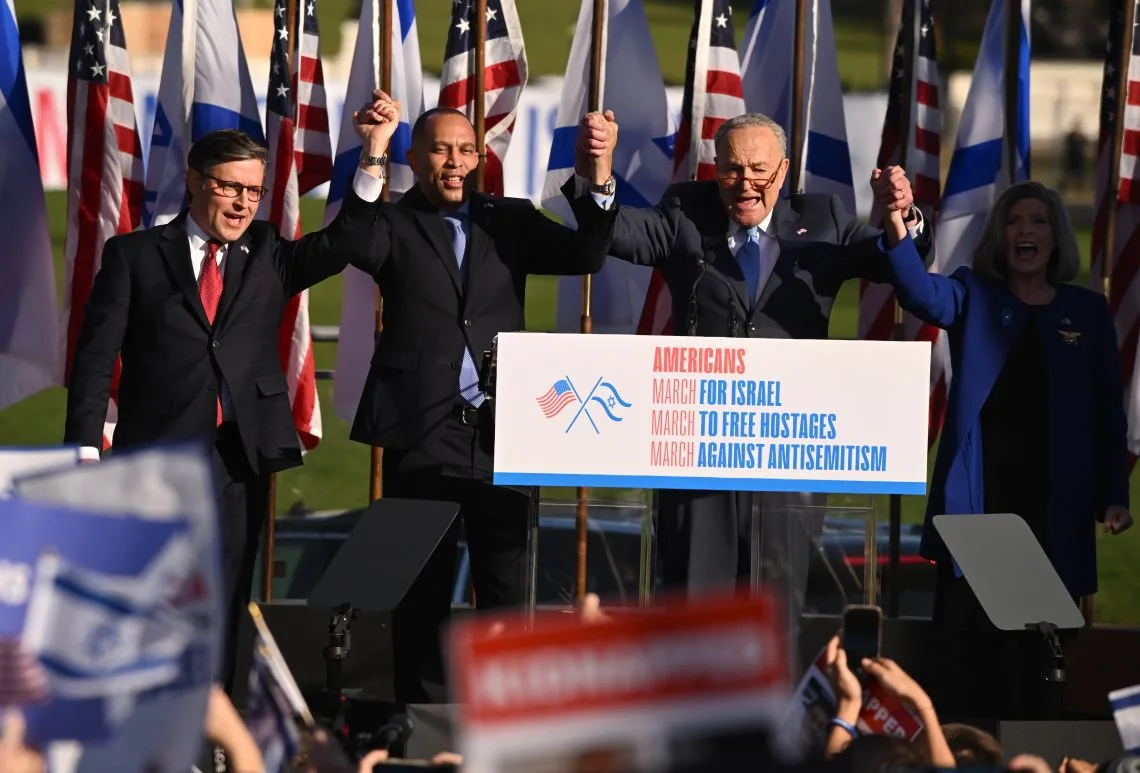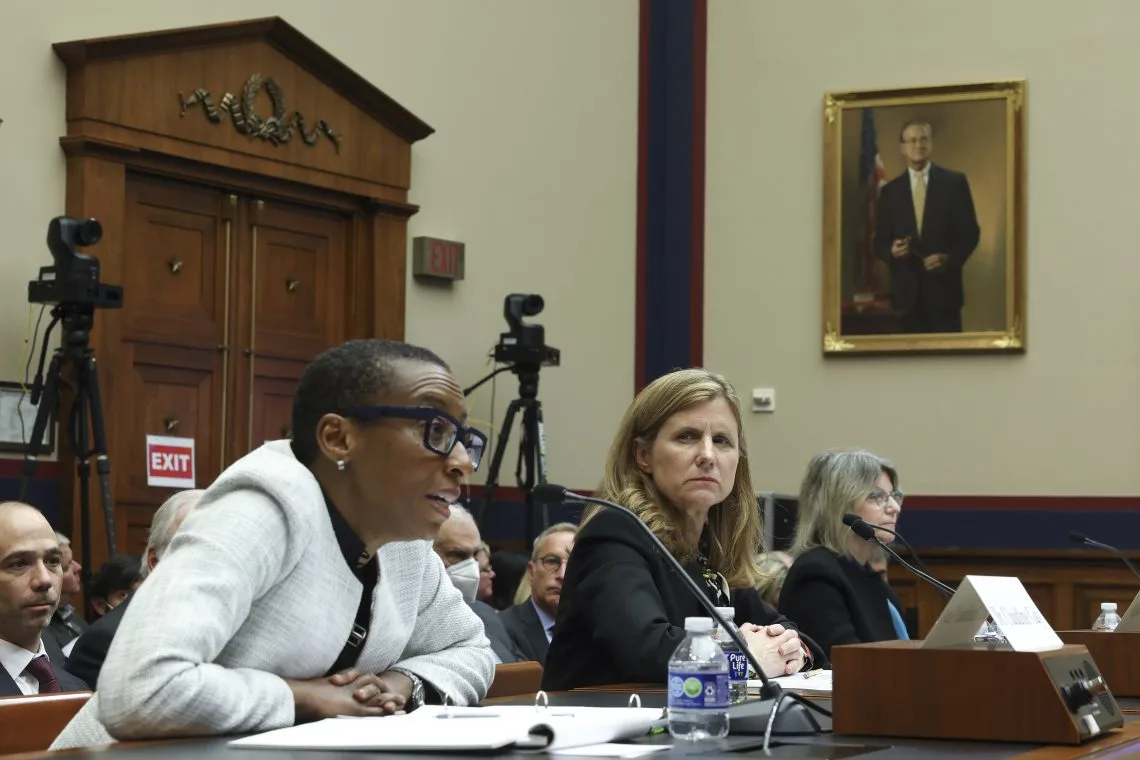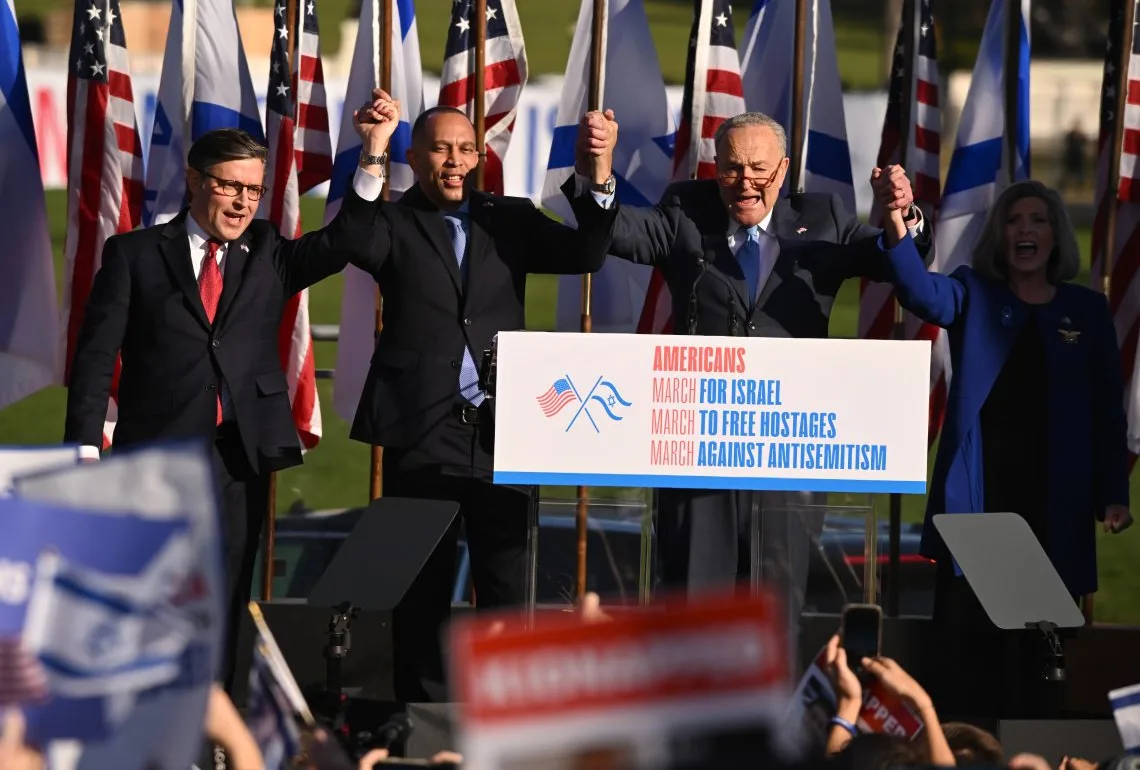The war between Israel and Hamas has placed a spotlight on antisemitism and anti-Zionism in the U.S., with implications for 2024 elections and broader ideological shifts.

In a nutshell
- The Gaza war continues to stoke political discord in the U.S.
- Accusations of antisemitism have riled higher education
- Debates around anti-Zionism are fracturing the left
The October 7, 2023, Hamas attacks on Israel and the subsequent war in Gaza have revealed an emerging divide in the United States that is impacting both domestic politics and foreign policy, on the issues of antisemitism and anti-Zionism. This debate has become a political fault line that may impact not only the national elections in 2024, but the shape of American society for years to come.
Cold War politics
October 7 and the response to it in the U.S. reflect changes in the American polity that have been building over recent decades. Early U.S. policies regarding Israel were greatly influenced by the Cold War. In 1948, U.S. President Harry Truman recognized Israel, becoming the first world leader to do so. (Soviet recognition quickly followed, but relations between Israel and the USSR would soon deteriorate.) Some American officials opposed recognizing Israel to avoid harming relations with Arab states, which were seen as critical, both to balance Soviet influence and for their oil resources. President Truman, however, sided with the view that the declaration was essential for U.S. leadership in response to the Holocaust and combating antisemitism, in addition to domestic political considerations.
In the ensuing years, the U.S.-Israel relationship assumed strategic importance as a counter to the expansion of Soviet power in the Middle East, especially with the major Arab-Israeli conflicts in 1967 and 1973. Ties with Israel became even more essential when the pro-Western regime in Iran was overthrown in 1979, leaving America with very few allies in the region.
Fighting antisemitism even became a weapon against the Soviets in the war of ideas. Amid rising antisemitism in the USSR following the Six-Day War, the Jackson-Vanik amendment to the 1974 Trade Act – passed unanimously by both parties in Congress – punished the Soviet regime for restricting the emigration of Jews seeking to flee.
Throughout the Cold War, the Soviet Union actively promoted an anti-Zionist ideology that was also laced with antisemitism. In this Soviet telling, Zionism – a movement of self-determination that had successfully founded the Jewish state after centuries of persecution and longing – was recast as a racist, colonialist and even fascist project. Efforts like the Anti-Zionist Committee of The Soviet Public aimed to deter Soviet Jews from emigrating by demonizing Israel — employing ugly antisemitic rhetoric in the process
As this campaign escalated following the Six-Day War of 1967, U.S. support for Israel and rejection of antisemitism were considered both broadly bipartisan and uncontroversial.
Ideological shifts
Today, this position is still shared by many across the U.S. political spectrum. In December, the U.S. House passed a Republican-drafted bill declaring that “anti-Zionism is antisemitism” by a margin of 311-14.
Notably, however, the measure was deeply polarizing on the left: 92 Democrats voted “present,” declining to support the resolution, in addition to the 13 Democrats and one Republican who voted against it. The House bill turned into a charged debate between the moderate and left wings of the Democratic Party.
In recent decades, the orthodoxy opposing both anti-Zionism and antisemitism in the U.S. has eroded due to several factors. For one, the American Jewish population has become an increasingly small minority while at the same time growing more secular and liberal. In contrast, the American Muslim population has grown substantially in recent years, becoming more politically active and influential.
The rise of new ideological currents in U.S. civil society and elite institutions like universities has also played a role. Narratives based in so-called identity politics – which pit the “oppressors” against the “oppressed” and demand dramatic measures to deliver social justice – have often cast both Jews and Israel as part of an oppressor class. An example of the latter has been the emergence of the “Boycott, Divestment, Sanctions” (BDS) movement, which came to prominence after the 2001 United Nations World Conference Against Racism in South Africa.
Both antisemitism and anti-Zionism, once mostly limited to fringe groups on both the left and right, have become more prevalent in progressive-dominated networks.
A 2021 Heritage Foundation study by Dr. Jay Greene and James Paul found that “university diversity, equity, and inclusion (DEI) staff often contribute to hostile conditions for Jewish students,” despite their ostensible role in promoting tolerance on campus. “Searching Twitter feeds of 741 DEI personnel at 65 universities shows the vast majority of tweets on Israel are critical to the point of being antisemitic,” the authors at the conservative think tank argued.
Efforts by institutions of higher education to distance themselves from accusations of antisemitism exploded in a December 2023 Congressional hearing, when the presidents of Harvard, MIT and the University of Pennsylvania were seen as evading questions on the issue, sparking an intense backlash.

Large-scale demonstrations and political activism have demonstrated the ability of the American progressive left to mobilize action on the street, at universities and through the news and social media. This was seen during the Black Lives Matter protests of 2021 and, more recently, in the public rallies and civil disobedience against Israel after October 7.
Public expressions of anti-Zionist sentiment have come amid a reportedly unprecedented rise in hate crimes against Jews. The head of the Federal Bureau of Investigation reported last October that Jewish people are the targets of some 60 percent of religion-based hate crimes, despite making up only 2.4 percent of the population. In January, the Anti-Defamation League found that antisemitic incidents were up 360 percent in the three months following Hamas’s October 7 attacks, according to preliminary data.
Traditional political sympathies between demographic groups are also shifting. Jewish groups and African American organizations often made common cause during the civil rights movement, while Jewish voters have also had strong links to white evangelicals. New strains of antisemitism have tested these allegiances.
Partisan divide
Americans today are increasingly divided between conservative and progressive ideologies. While traditionally many American Jews had straddled the divide, that position is becoming increasingly untenable.
October 7 and its aftermath have heightened tensions around both anti-Zionist sentiment and perceived antisemitism in the Democratic party – and between traditional pro-Israel members and an anti-Israel wing that is growing more vocal. These tensions are reflected in the Middle East policies of President Joe Biden. Mr. Biden has tried to occupy an increasingly uncomfortable middle ground between the factions of his party supporting Israel and those aligning with the Palestinian cause.
In one telling episode, Mr. Biden last year included the Council on American-Islamic Relations (CAIR) as a partner for its first-ever national strategy to counter antisemitism. The White House was later forced to drop the partnership after CAIR’s director praised the October Hamas attacks in what the administration called “shocking, Antisemitic statements.” Separately, amid criticism from Muslim voters over the President’s support for Israel, in November the White House announced a planned strategy to combat Islamophobia.
On the right, white supremacists and other hate groups associated with the radical right are also guilty of antisemitic activity. While they are less representative of institutional conservative structures, some observers have also attempted to link mainstream conservative politics with antisemitism. Critics of former President Donald Trump, for example, have charged him with antisemitism, citing episodes like his accusing Jews of “disloyalty” for voting Democratic. He and his defenders have pointed to his staunchly pro-Israel record and policies combating antisemitism, as well as his Jewish grandchildren.
Scenarios
The current debates around anti-Zionism and antisemitism in the U.S. are intensifying the contest for America’s political center. The most likely scenario is that these issues will widen the fracturing of the American left. The traditional political affiliations of Democratic constituencies – including Jews, African Americans, and college-educated white voters – could diverge. Liberal Muslim voters could become more frustrated with what they see as a feckless Democratic leadership that is not fully embracing their position on the Israeli-Palestinian conflict. These disruptions of traditional voting patterns could affect the results of national elections, in 2024 and beyond.
In the medium term, antisemitic activity is unlikely to soon subside and will exacerbate friction between the American right and left, notably within public education institutions and on social media. Policies based on DEI and ESG (environmental, social and governance) and political philosophies like antiracism will continue to stoke controversy – between progressives who see themselves as advocates of social justice and conservatives who see them instead as fueling religious intolerance and threatening freedom of expression, public safety and good governance.
For industry-specific scenarios and bespoke geopolitical intelligence, contact us and we will provide you with more information about our advisory services.




